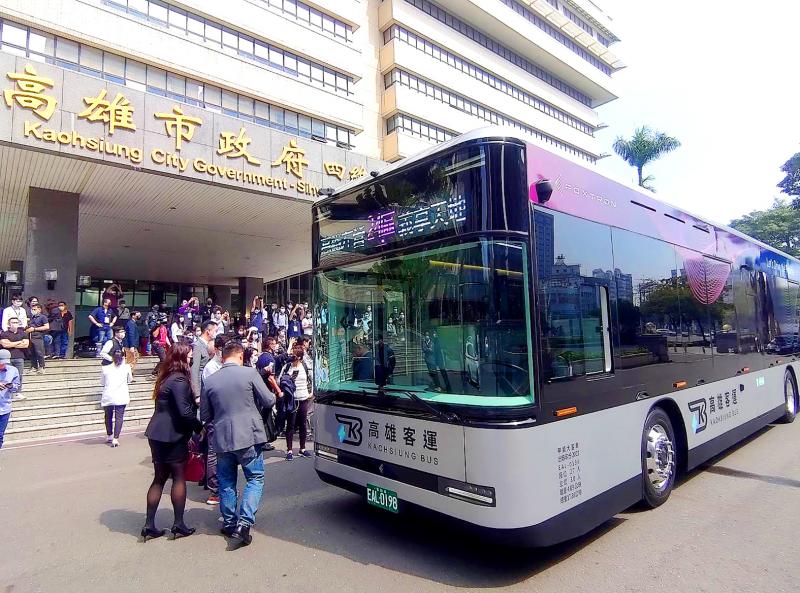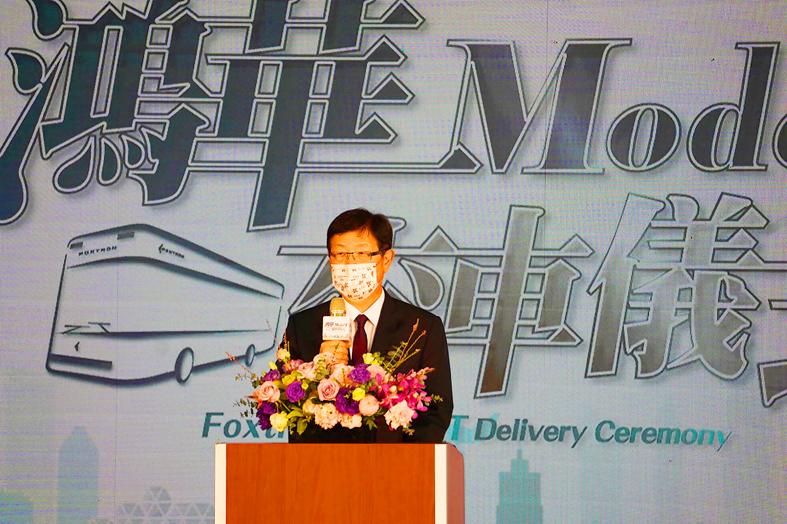Hon Hai Technology Group (鴻海科技集團) yesterday unveiled a blueprint to deploy an electric bus ecosystem in Kaohsiung, including plans for a manufacturing facility and battery pack capacity.
The group plans to create an electric vehicle (EV) design and manufacturing center in the Southern Taiwan Science Park’s (南部科學園區) newly developed section in Kaohsiung’s Ciaotou District (橋頭), Hon Hai chairman Young Liu (劉揚偉) told reporters.
To push for a greater proportion of its EV components to be supplied in-house, Hon Hai is mulling whether to make battery packs and cells at the Ciaotou Science Park (橋頭科學園區), Liu said.

Photo: Wang Jung-hsiang, Taipei Times
To provide seamless energy support, Hon Hai is assessing the feasibility of installing energy storage systems at the Ho Fa Industrial Park (和發產業園區) in the port city, he said.
The company aims to boost components supply from its MIH Open Platform members for three major electric systems — battery management, vehicle control and motor control units — to 90 percent by 2024, up from 65 percent currently, he said.
By 2024, it would be able to produce solid-state lithium-ion batteries and motor control systems, the company said.

Photo: CNA
Hon Hai plans to link its EV ecosystem to Kaohsiung’s smart city infrastructure by offering integrated solutions, Liu said.
It is in talks with the Kaohsiung City Government to scout potential sites for the project, he said.
Liu made the remarks at a news conference at which Foxtron Vehicle Technologies Co (鴻華先進) — a Hon Hai-Yulon Motors Co (裕隆) EV design and manufacturing venture — delivered its first electric Model T bus to Kaohsiung Bus Co (高雄客運), which is owned by San-Ti Group (三地集團).
The Kaohsiung-based conglomerate’s North-Star Petroleum Co (北基國際), a gasoline station chain, is to be in charge of installing EV chargers for buses built by Foxtron.
North-Star in April last year formed a partnership with Delta Electronics Inc (台達電) to introduce charging systems at the chain’s 57 gas stations.
Foxtron plans to deliver 30 electric buses to San-Ti this year, said Liu, who is Foxtron’s chairman.
Foxtron aims to ship up to 150 electric buses to local customers this year, the company said.
Foxtron is seeking a 50 percent share of the nation’s electric bus market by 2030, said Michael Kuo (郭耀聰), a special assistant to the company’s CEO.
To comply with the government’s proposed electrification plans, about 30,000 fossil-fuel-powered buses would have to be swapped for electric buses by that time, Kuo said.
Asked how Russia’s invasion of Ukraine would affect supply of key components, Liu said that some customers have asked that shipments to those countries be halted.
The supply of cabling for EVs has been affected, but the impact is insignificant at the moment, he said.
When asked about Hon Hai’s partnership with Lordstown Motors Corp, Liu said that a deal to buy assets of the Ohio-based EV maker went smoothly.
Hon Hai is making vehicles for the electric truck maker, he said.
However, Hon Hai has no intention to participate in Lordstown’s new fundraising program, Liu said.

STEEP DECLINE: Yesterday’s drop was the third-steepest in its history, the steepest being Monday’s drop in the wake of the tariff announcement on Wednesday last week Taiwanese stocks continued their heavy sell-off yesterday, as concerns over US tariffs and unwinding of leveraged bets weighed on the market. The benchmark TAIEX plunged 1,068.19 points, or 5.79 percent, to 17,391.76, notching the biggest drop among Asian peers as it hit a 15-month low. The decline came even after the government on late Tuesday authorized the NT$500 billion (US$15.2 billion) National Stabilization Fund (國安基金) to step in to buoy the market amid investors’ worries over tariffs imposed by US President Donald Trump. Yesterday’s decline was the third-steepest in its history, trailing only the declines of 2,065.87 points on Monday and

TAKING STOCK: A Taiwanese cookware firm in Vietnam urged customers to assess inventory or place orders early so shipments can reach the US while tariffs are paused Taiwanese businesses in Vietnam are exploring alternatives after the White House imposed a 46 percent import duty on Vietnamese goods, following US President Donald Trump’s announcement of “reciprocal” tariffs on the US’ trading partners. Lo Shih-liang (羅世良), chairman of Brico Industry Co (裕茂工業), a Taiwanese company that manufactures cast iron cookware and stove components in Vietnam, said that more than 40 percent of his business was tied to the US market, describing the constant US policy shifts as an emotional roller coaster. “I work during the day and stay up all night watching the news. I’ve been following US news until 3am

Six years ago, LVMH’s billionaire CEO Bernard Arnault and US President Donald Trump cut the blue ribbon on a factory in rural Texas that would make designer handbags for Louis Vuitton, one of the world’s best-known luxury brands. However, since the high-profile opening, the factory has faced a host of problems limiting production, 11 former Louis Vuitton employees said. The site has consistently ranked among the worst-performing for Louis Vuitton globally, “significantly” underperforming other facilities, said three former Louis Vuitton workers and a senior industry source, who cited internal rankings shared with staff. The plant’s problems — which have not

TARIFF CONCERNS: The chipmaker cited global uncertainty from US tariffs and a weakening economic outlook, but said its Singapore expansion remains on track Vanguard International Semiconductor Corp (世界先進), a foundry service provider specializing in producing power management and display driver chips, yesterday withdrew its full-year revenue projection of moderate growth for this year, as escalating US tariff tensions raised uncertainty and concern about a potential economic recession. The Hsinchu-based chipmaker in February said revenues this year would grow mildly from last year based on improving supply chain inventory levels and market demand. At the time, it also anticipated gradual quarter revenue growth. However, the US’ sweeping tariff policy has upended the industry’s supply chains and weakened economic prospects for the world economy, it said. “Now